Relevant
books
available at Amazon
Eusebius studies and translations
with links to Amazon
Several also below
TEXTS &
TRANSLATIONS
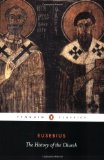 
History of the Church Andrew Louth ed. ----- 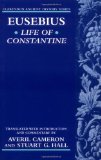 
Cameron and Hall ----- In Praise of Constantine: Historical Study and New Translation of Eusebius' Tricennial Orations (University of California publications, classical studies ; v. 15)
-----
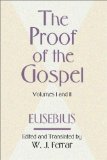 
W. J. Ferrar
-----
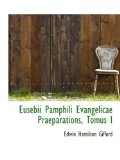 
Eusebii Pamphili Evangelicae Praeparations, Tomus I (Greek Edition)
Edwin Hamilton Gifford
-----
Eusebius, Bishop of Caesarea - the Ecclesiastical History and the Martyrs of Palestine. Two Volumes
-----
Eusebius ... On the Theophania Or Divine Manifestation of Our Lord and Saviour Jesus Christ, Tr. with Notes: To Which Is Prefixed a Vindication of the ... of That Distinguished Writer, by S. Lee
-----
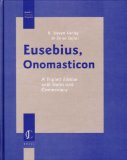 
Notley and Safrai
-----
STUDIES 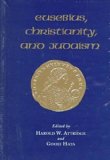 
Eusebius, Christianity and Judaism Harold W. Attridge ----- 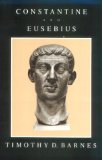 
Constantine and Eusebius Timothy Barnes ----- 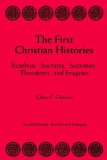 
Glenn Chesnut ----- 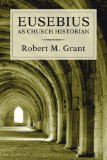 
Robert Grant ----- 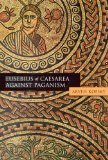 
Eusebius of Caesarea Against Paganism Aryeh Kofsky ----- Eusebius of Caesarea and the Arian Crisis
C. Luibheid ----- 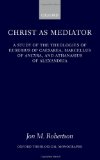 
Christ as Mediator: A Study of the Theologies of Eusebius of Caesarea,
Marcellus of Ancyra, and Athanasius of Alexandria
Jon M. Robertson
----- Eusebius of Caesarea
Wallace-Hadrill
|
Chapter II. The
Training of Origen from Childhood.
1. MANY things might be said in attempting to describe the life of the man while
in school; but this subject alone would require a separate treatise.
Nevertheless, for the present, abridging most things, we shall state a few facts
concerning him as briefly as possible, gathering them from certain letters, and
from the statement of persons still living who were acquainted with him. 2. What
they report of Origen seems to me worthy of mention, even, so to speak, from his
swathing-bands. It was the tenth year of the reign of Severus, while Lætus was
governor of Alexandria and the rest of Egypt, and Demetrius had lately received
the episcopate of the parishes there, as successor of Julian. 3. As the flame of
persecution had been kindled greatly, and multitudes had gained the crown of
martyrdom, such desire for martyrdom seized the soul of Origen, although yet a
boy, that he went close to danger, springing forward and rushing to the conflict
in his eagerness. 4. And truly the termination of his life had been very near
had not the divine and heavenly Providence, for the benefit of many, prevented
his desire through the agency of his mother. 5. For, at first, entreating him,
she begged him to have compassion on her motherly feelings toward him; but
finding, that when he had learned that his father had been seized and
imprisoned, he was set the more resolutely, and completely carried away with his
zeal for martyrdom, she hid all his clothing, and thus compelled him to remain
at home. 6. But, as there was nothing else that he could do, and his zeal beyond
his age would not suffer him to be quiet, he sent to his father an encouraging
letter on martyrdom, in which he exhorted him, saying,“Take heed not to change
your mind on our account.” This may be recorded as the first evidence of
Origen’s youthful wisdom and of his genuine love for piety. 7. For even then he
had stored up no small resources in the words of the faith, having been trained
in the Divine Scriptures from childhood. And he had not studied them with
indifference, for his father, besides giving him the usual liberal education,
had made them a matter of no secondary importance. 8. First of all, before
inducting him into the Greek sciences, he drilled him in sacred studies,
requiring him to learn and recite every day. 9. Nor was this irksome to the boy,
but he was eager and diligent in these studies. And he was not satisfied with
learning what was simple and obvious in the sacred words, but sought for
something more, and even at that age busied himself with deeper speculations. So
that he puzzled his father with inquiries for the true meaning of the inspired
Scriptures. 10. And his father rebuked him seemingly to his face, telling him
not to search beyond his age, or further than the manifest meaning. But by
himself he rejoiced greatly and thanked God, the author of all good, that he had
deemed him worthy to be the father of such a child. 11. And they say that often,
standing by the boy when asleep, he uncovered his breast as if the Divine Spirit
were enshrined within it, and kissed it reverently; considering himself blessed
in his goodly offspring. These and other things like them are related of Origen
when a boy. 12. But when his father ended his life in martyrdom, he was left
with his mother and six younger brothers when he was not quite seventeen years
old. 13. And the property of his father being confiscated to the royal treasury,
he and his family were in want of the necessaries of life. But he was deemed
worthy of Divine care. And he found welcome and rest with a woman of great
wealth, and distinguished in her manner of life and in other respects. She was
treating with great honor a famous heretic then in Alexandria; who, however, was
born in Antioch. He was with her as an adopted son, and she treated him with the
greatest kindness. 14. But although Origen was under the necessity of
associating with him, he nevertheless gave from this time on strong evidences of
his orthodoxy in the faith. For when on account of the apparent skill in
argument of Paul,—for this was the man’s name,—a great multitude came to him,
not only of heretics but also of our people, Origen could never be induced to
join with him in prayer; for he held, although a boy, the rule of the Church,
and abominated, as he somewhere expresses it, heretical teachings. Having been
instructed in the sciences of the Greeks by his father, he devoted him after his
death more assiduously and exclusively to the study of literature, so that he
obtained considerable preparation in philology and was able not long after the
death of his father, by devoting himself to that subject, to earn a compensation
amply sufficient for his needs at his age.
Chapter III. While still very Young, he taught diligently the Word of
Christ.
1. BUT while he was lecturing in the school, as he tells us himself, and there
was no one at Alexandria to give instruction in the faith, as all were driven
away by the threat of persecution, some of the heathen came to him to hear the
word of God. 2. The first of them, he says, was Plutarch, who after living well,
was honored with divine martyrdom. The second was Heraclas, a brother of
Plutarch; who after he too had given with him abundant evidence of a philosophic
and ascetic life, was esteemed worthy to succeed Demetrius in the bishopric of
Alexandria. 3. He was in his eighteenth year when he took charge of the
catechetical school. He was prominent also at this time, during the persecution
under Aquila, the governor of Alexandria, when his name became celebrated among
the leaders in the faith, through the kindness and goodwill which he manifested
toward all the holy martyrs, whether known to him or strangers. 4. For not only
was he with them while in bonds, and until their final condemnation, but when
the holy martyrs were led to death, he was very bold and went with them into
danger. So that as he acted bravely, and with great boldness saluted the martyrs
with a kiss, oftentimes the heathen multitude round about them became
infuriated, and were on the point of rushing upon him. 5. But through the
helping hand of God, he escaped absolutely and marvelously. And this same divine
and heavenly power, again and again, it is impossible to say how often, on
account of his great zeal and boldness for the words of Christ, guarded him when
thus endangered. So great was the enmity of the unbelievers toward him, on
account of the multitude that were instructed by him in the sacred faith, that
they placed bands of soldiers around the house where he abode. 6. Thus day by
day the persecution burned against him, so that the whole city could no longer
contain him; but he removed from house to house and was driven in every
direction because of the multitude who attended upon the divine instruction
which he gave. For his life also exhibited right and admirable conduct according
to the practice of genuine philosophy. 7. For they say that his manner of life
was as his doctrine, and his doctrine as his life. Therefore, by the divine
Power working with him he aroused a great many to his own zeal. 8. But when he
saw yet more coming to him for instruction, and the catechetical school had been
entrusted to him alone by Demetrius, who presided over the church, he considered
the teaching of grammatical science inconsistent with training in divine
subjects, and forthwith he gave up his grammatical school as unprofitable and a
hindrance to sacred learning. 9. Then, with becoming consideration, that he
might not need aid from others, he disposed of whatever valuable books of
ancient literature he possessed, being satisfied with receiving from the
purchaser four oboli a day. For many years he lived philosophically in this
manner, putting away all the incentives of youthful desires. Through the entire
day he endured no small amount of discipline; and for the greater part of the
night he gave himself to the study of the Divine Scriptures. He restrained
himself as much as possible by a most philosophic life; sometimes by the
discipline of fasting, again by limited time for sleep. And in his zeal he never
lay upon a bed, but upon the ground. 10. Most of all, he thought that the words
of the Saviour in the Gospel should be observed, in which he exhorts not to have
two coats nor to use shoes nor to occupy oneself with cares for the future. 11.
With a zeal beyond his age he continued in cold and nakedness; and, going to the
very extreme of poverty, he greatly astonished those about him. And indeed he
grieved many of his friends who desired to share their possessions with him, on
account of the wearisome toil which they saw him enduring in the teaching of
divine things. 12. But he did not relax his perseverance. He is said to have
walked for a number of years never wearing a shoe, and, for a great many years,
to have abstained from the use of wine, and of all other things beyond his
necessary food; so that he was in danger of breaking down and destroying his
constitution. 13. By giving such evidences of a philosophic life to those who
saw him, he aroused many of his pupils to similar zeal; so that prominent men
even of the unbelieving heathen and men that followed learning and philosophy
were led to his instruction. Some of them having received from him into the
depth of their souls faith in the Divine Word, became prominent in the
persecution then prevailing; and some of them were seized and suffered
martyrdom.
|

